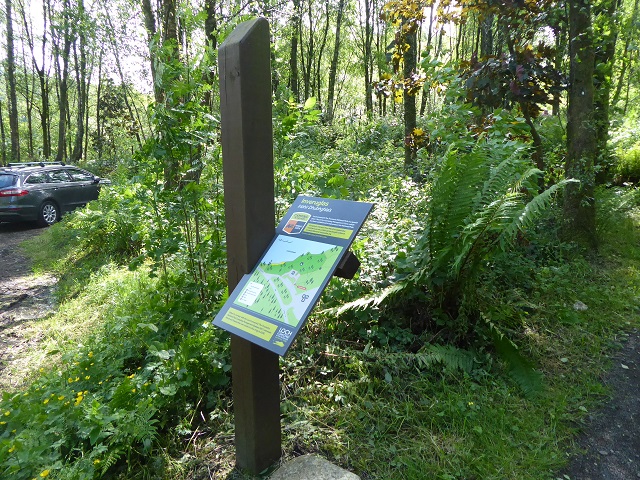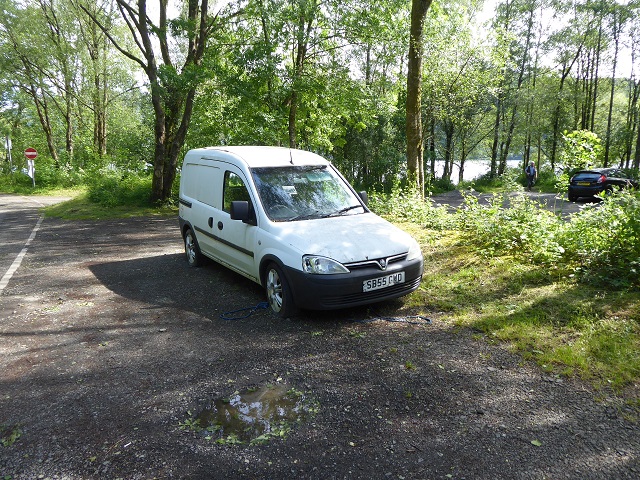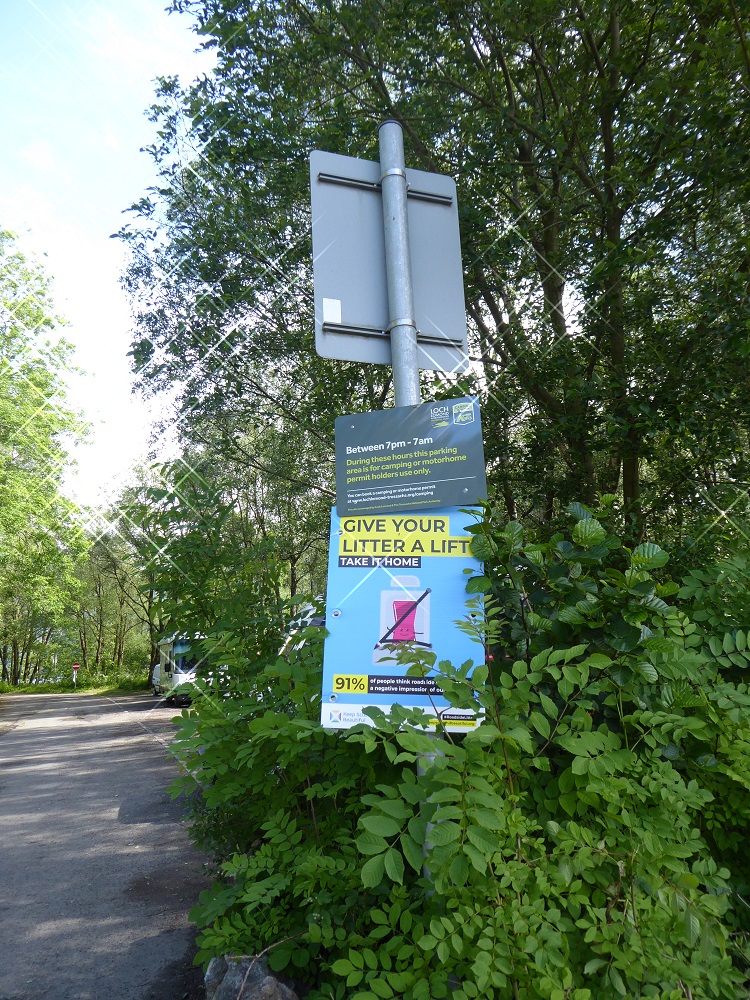
On 15th May, after climbing in Glen Coe, I stopped off to show my climbing partner the camping permit area at Inveruglas – one of several the Loch Lomond and Trossachs National Park has created which are not fit for purpose. Most of the permit area – like many others in the National Park – is overgrown with vegetation, much of which is bramble which no-one in their right mind would camp on. There is one small space which has been cleared of bramble and is sloping and bumpy:

I have never seen anyone camping here. My climbing partner described it as “horrible”. Someone in the LLTNPA must know this but it doesn’t stop them trying to sell permits for up to five tents here on their online permit booking system (see here). My reckoning is three small tents could just about fit – but perhaps five Board Members could come and camp here for the night and prove me wrong?
The LLTNPA has had to systematically inflate the number of permits beyond the capacity of many permit areas so they can claim to Scottish Ministers to have provided the 300 “new” camping places they promised would accompany the camping byelaws.
My companion went back to Inveruglas to have another look on 25th May and realised that a van “parked” on our first visit was still there.

It had actually been abandoned and he sent me some photos to prove it.

On 13th June I dropped by and the van was still there – so it has been there now at least a month. This is on land leased and managed by the Loch Lomond and Trossachs National Park Authority which Rangers patrol on a daily basis. So what has the LLTNPA done about this?

The presence of the van rather undermined the new posters which have gone up at the edge of the campervan permit area at Inveruglas.
The message in the posters, however, which is about roadside litter, are welcome. This appears to be an initiative of the newly appointed Litter Prevention Manager who appears to understand what the real problems are and where the LLTNPA needs to focus its efforts (instead of trying to ban innocent campers) No-one has ever talked of banning drivers from the National Park because of all the litter thrown from cars:
“Litter Prevention: The appointment of our first ever Litter Prevention Manager has already enabled a focus on some quick wins; noteably, in partnership with Argyll and Bute Council a joint roadside litter pick (124 bags) on the A82 between Duck Bay and Luss. More joint activities are planned as part of Keep Scotland Beautiful’s #SpringClean19 – including six volunteer events and an all staff, all day litter challenge”
(Extract from Chief Executive Officer Report to Board June 2019)
So, on one small stretch of the A82, 124 bags of litter. How does that compare to the litter left by campers and fly-tipping?
Gordon Watson the Chief Executive goes on to say under same item on “Litter Prevention”:
“Great progress has been made engaging with the Procurator Fiscal and Justices of the Peace on byelaws, litter and fly-tipping with the National Park Authority being responsible for half of the six reported national successful prosecutions for fly-tipping last year.”
Its great the Park is starting to take flytipping more seriously, just a shame that Mr Watson still appears to equate it with camping.

Last week I also spotted a caravan which had been deliberately dumped in a layby south of Firkin Point (its number plates had been removed). Abandoned and crashed (see here for example) vehicles appear to be quite a problem in the National Park.
On the other side of the A82 , the remains of the burnt out caravan north of Luss I had reported on in April (see here) had been removed.
In the same layby there was an encampment with three caravans:

Now, while there are laws to deal with encampments, I don’t believe this encampment was causing a problem. Its tucked away, there is plenty of space and there was little sign of litter by the caravans – except bagged up.

There was also nothing to associate the dumped wheel in the bay beyond with the caravans (just as there is nothing to associate most of the flytipping in other laybys with campers). This sort of dumping goes on the whole time.
Its worth reflecting, however, that one of the main justifications the LLTNPA gave to Scottish Ministers and local communities for introducing the camping byelaws was to address problems caused by (some) caravans encamped in laybys. The byelaws were never implemented against caravans because of the legal right people have to stay in vehicles overnight on the road network and also because off-road some residents of the National Park live in caravans. Last year the LLTNPA announced they had handed over to Police Scotland responsibility for dealing with vehicle encampments, effectively admitting the byelaws were unworkable and unnecessary.
It was interesting to read, therefore, the Annual Report for Operation Ironworks for 2018 (see here). This is the initiative that takes place each year to address crime and anti-social behaviour among visitors to the National Park and is led by Police Scotland in partnership with the LLTNPA and Forestry Commission Scotland. Although there is quite a bit on enforcement of the camping byelaws – six months after the Park reported on this to Ministers – there is NOT a single mention in the whole document about Police Scotland action against encampments of caravans.
Now I don’t blame the police for this, they have far better things to do and no doubt appreciate that people trying to work in the National Park over the summer need to have somewhere to live. It does, however, show up the stupidity and hyprocrisy of the camping byelaws. The LLTNPA has been wasting huge resources trying to ban something that never was the main problem and has ended up in the untenable position of banning tents from places where it now allows campervans and caravans to stop off.
If you want further proof the byelaws haven’t worked, consider this photo from the LLTNPA section of the Ironworks Report:

Creating permit zones clearly hasn’t, as intended, stopped people from abandoning their campsites.
And for those who believe tents abandoned like this justifies banning campers, consider the time it takes to clear up this mess compared to that dumped along the A82 and then explain why we don’t ban all drivers. Yes, camping litter its a problem, but not one that has ever justified removing people’s right to camp.
The Litter Manager appears to have made a good start in doing practical things to tackle the major litter issues that the LLTNPA has failed to address for so long. For them to succeed, however, will I believe require the LLTNPA to change direction and I don’t think they will do that unless forced to do so. The photo above shows the focus of senior management is still on the wrong things.

Well done for continuing to highlight this absurd situation, amongst all the other excellent reporting you do. The Authority’s chief exec, Gordon Watson, must be totally obsessed with camping and litter to have kept the bylaws going so long at such expense. Yet if I review his twitter feed (@LochLomondCEO) it’s mostly covering water sports (his private passion), new hires, and being seen in the community. I note there was a three day “litter prevention challenge” that appears to have resulted in … lots of discussion about litter bins and how to make sure they are emptied; how to report rubbish and how rangers could get alerted. What I can’t see is any reference at all to that alleged major cause of rubbish… camping. One photo shows a large posted from the LLTNPA entitled “how might we address litter prevention” – it has lots of sensible ideas, but again, no mention of that demon camping.
If I were running a litter prevention challenge I’d be thinking a little more laterally. For example, rather than simply encouraging visitors to “take their litter with them”, why not motivate campers and visitors to take ANY litter away. Pay a small amount by weight for rubbish collected – and provide somewhere convenient for it to be taken too on the way home (the Authority HQ?) – and I suspect you’d get a queue at the door. Imagine how quickly that abandoned van or caravan would go!#
As Nik Turner, the LLTNPA’s Litter Manager, stated in a recent local news article: “Littering is a complex behaviour and there isn’t a “silver bullet” that anyone has found to fix it”… not even camping byelaws, she might have added.
Andrew, incentivising visitors to collect rubbish is a great idea but I am not even sure it would need money. The Park now admits its only a small minority of campers who created problems but instead of bringing the vast majority of responsible campers on board they decided to ban to drastically reduce their rights. That alienates the people who should have been the Park’s strongest supporters. Had the Park created new rubbish collection points and provided some litter pickers, lots of people might have helped them out. Few people want to camp with litter around them. Instead now they get complaints about the state of the permit areas they have created. You could apply the same principles to visitors in general – all this though needs improvements in litter disposal infrastructure which gets passed between public authorities like a hot potato…………
I stopped picking up other peoples rubbish when the camping ban was introduced. I have also had recent news that loch drunkie is covered in human excrement and not fit for camping it’s everywhere was the comment
There is , of course, a huge conundrum inherent in the way Scotland approaches the blight of litter – the moment anyone picks up what they find, they then become the “owner” of that litter. Should the owner of a non domestic property not have a local authority permit to have litter collected , or if they transport the excess of litter elsewhere, they could be fined for transport or possession of it. Properties let more than 140days are rated Non domestic. They must have an agreement with a waste disposal firm or local authority for collection of waste. They are not permitted to dispose of anywaste at all into council collection facilities or bins unless they pay for a permit. With all this in mind it is not hard to spot where the “disconnect” begins .
It has to be recognised that it is far far cheaper for local authorities to collect all countryside rubbish, everywhere, from proper bins. Any attempt to gather it up, spasmodically , sometime later, employing part time or volunteer staff is doomed to fail. Government must fund ‘recycling centres’ in every community that are truly open to everyone.
A system is universal in NL. where a restricted annual use householder card permit system, operates, with small excess fees for extra visits. A premium rate subscription permit operates for qualifying businesses, with volume/weight charge at the gate, over a weighbridge. The present ” Land Fill taxation” policy lies behind all these littering issues. Waste does not disappear when it is deemed un-authorised for collection, without visible “owner”. It blights every rural and inner city location, and yet must be gathered up sometime?
That van might have been there for some time!
Tax expired 04 April 2017
MOT expired 24 August 2018